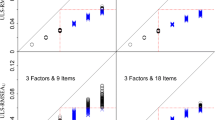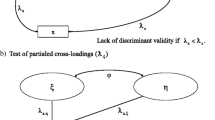Abstract
We present new results on a recently developed method of factor analysis of data with ordinal attributes. The method is based on the apparatus of logic, the theory of relations and ordered sets, and provides an alternative to traditional methods of factor analysis. It utilizes formal concepts as factors and we demonstrate on several examples using sports data that the factors produced by the method are reasonable and easy-to-interpret. In addition, we propose ways to address various natural questions regarding the method and its use and put forward new research issues.
Similar content being viewed by others
References
Bartl, E., Belohlavek, R., Konecny, J.: Optimal decompositions of matrices with grades into binary and graded matrices. Ann. Math. Artif. Intell. 59(2), 151–167 (2010)
Belohlavek, R.: Fuzzy Relational Systems: Foundations and Principles. Kluwer Academic/Plenum Publishers, New York (2002)
Belohlavek, R.: Concept lattices and order in fuzzy logic. Ann. Pure Appl. Logic 128(1–3), 277–298 (2004)
Belohlavek, R.: Optimal decompositions of matrices with entries from residuated lattices. J. Logic Comput. 22(6), 1405–1425 (2012)
Belohlavek, R.: Ordinally equivalent data: a measurement-theoretic look at formal concept analysis of fuzzy attributes. Int. J. Approx. Reason. 54(9), 1496–1506 (2013)
Belohlavek, R., Krmelova, M.: Beyond Boolean matrix decompositions: toward factor analysis and dimensionality reduction of ordinal data, pp. 961–966. ICDM (2013)
Belohlavek, R., Sklenar, V., Zacpal, J.: Crisply generated fuzzy concepts. LNAI 3403, 268–283 (2005)
Belohlavek, R., Vychodil, V.: Discovery of optimal factors in binary data via a novel method of matrix decomposition. J. Comput. Syst. Sci. 76(1), 3–20 (2010)
Belohlavek, R., Vychodil, V.: Factor analysis of incidence data via novel decomposition of matrices. LNAI 5548, 83–97 (2009)
Belohlavek, R., Vychodil, V.: Formal concept analysis and linguistic hedges. Int. J. Gen. Syst. 41(5), 503–532 (2012)
Eldén, L.: Matrix Methods in Data Mining and Pattern Recognition. SIAM, Philadelphia (2007)
Ganter, B., Wille, R.: Formal Concept Analysis. Mathematical Foundations. Springer, Berlin (1999)
Geerts, F., Goethals, B., Mielikäinen, T.: Tiling databases. DS. LNCS 3245, 278–289 (2004)
Golub, G., Van Loan, C.: Matrix Computations. Johns Hopkins University Press, Baltimore (1996)
Goguen, J.A.: The logic of inexact concepts. Synthese 18(1968–1969), 325–373
Gottwald, S.: A Treatise on Many-Valued Logics. Research Studies Press, Baldock (2001)
Hájek, P.: Metamathematics of Fuzzy Logic. Kluwer, Dordrecht (1998)
Lee, D., Seung, H.: Learning the parts of objects by non-negative matrix factorization. Nature 401, 788–791 (1999)
Miettinen, P., Mielikäinen, T., Gionis, A., Das, G., Mannila, H.: The discrete basis problem. IEEE Trans. Knowl. Data Eng. 20(10), 1348–1362 (2008)
Miettinen, P., Vreeken, J.: Model order selection for Boolean matrix factorization. Proc. ACM SIGKDD, 51–59 (2011)
Miller, G.A.: The magical number seven, plus or minus two: some limits on our capacity for processing information. Psychol. Rev. 63, 81–97 (1956)
Stockmeyer, L.J.: The set basis problem is NP-complete. IBM Research Report RC5431, Yorktown Heights (1975)
Tatti, N., Mielikäinen, T., Gionis, A., Mannila, H.: What is the dimension of your binary data? In: The 2006 IEEE conference on data mining (ICDM 2006), pp. 603–612. IEEE Computer Society (2006)
Zadeh, L.A.: Fuzzy sets. Inf. Control. 8, 338–353 (1965)
Author information
Authors and Affiliations
Corresponding author
Additional information
We acknowledge support by Grant No. P202/10/0262 of the Czech Science Foundation. A preliminary version of this paper was presented at CLA 2012.
Rights and permissions
About this article
Cite this article
Belohlavek, R., Krmelova, M. Factor analysis of ordinal data via decomposition of matrices with grades. Ann Math Artif Intell 72, 23–44 (2014). https://doi.org/10.1007/s10472-014-9398-6
Published:
Issue Date:
DOI: https://doi.org/10.1007/s10472-014-9398-6




